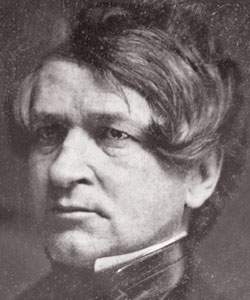William Lewis Dayton (Congressional Biographical Directory)
Reference
DAYTON, William Lewis, a Senator from New Jersey; born in Basking Ridge, Somerset County, N.J., February 17, 1807; attended Trenton (N.J.) Academy and was graduated from the College of New Jersey (now Princeton University) in 1825; studied law; admitted to the bar in 1830 and commenced practice in Freehold, N.J.; member, State council 1837-1838: associate judge of the State supreme court 1838- 1841, when he resigned; appointed and subsequently elected as a Whig to the United States Senate to fill the vacancy caused by the death of Samuel L. Southard; reelected in 1845, and served from July 2, 1842, to March 3, 1851; unsuccessful candidate for reelection; chairman, Committee on Public Buildings (Twenty-seventh and Twenty-eighth Congresses), Committee on Engrossed Bills (Twenty-eighth Congress); resumed the practice of law; nominated in 1856 by the Republican Party as its candidate for vice president on the ticket with John C. Frémont; attorney general of New Jersey 1857-1861; appointed Minister to France on March 18, 1861, and served until his death in Paris, December 1, 1864; interment in Riverview Cemetery, Trenton, N.J.
“Dayton, William Lewis,” Biographical Directory of the United States Congress, 1774 to Present, http://bioguide.congress.gov/scripts/biodisplay.pl?index=D000166.
William Lewis Dayton (American National Biography)
Scholarship
Reelected by the New Jersey legislature in 1845 for a full six-year term, Dayton was a senator until March 1851. His contributions to the legislation of this era were few, partly because his party was out of power much of the time and partly because of his cautious, self-effacing nature and his insistence on remaining politically independent, refusing to act against his personal convictions under pressure from leaders of the legislature, to which he was beholden for his Senate seat. Eschewing notoriety, he was esteemed more for his quiet common sense than for oratorical eloquence or vision.
On one issue Dayton stood out among his fellow senators. At a time when it would have been politically expedient in New Jersey, the northern state most sympathetic to the South's "peculiar institution," to refrain from antislavery pronouncements, Dayton voted against making war on Mexico as a way of expanding slave territory, supported the Wilmont Proviso excluding slavery from the lands acquired from Mexico, opposed the admission of Texas as a slave state, and spoke vehemently against the Compromise of 1850 as enhancing the power of slavery.
On one issue Dayton stood out among his fellow senators. At a time when it would have been politically expedient in New Jersey, the northern state most sympathetic to the South's "peculiar institution," to refrain from antislavery pronouncements, Dayton voted against making war on Mexico as a way of expanding slave territory, supported the Wilmont Proviso excluding slavery from the lands acquired from Mexico, opposed the admission of Texas as a slave state, and spoke vehemently against the Compromise of 1850 as enhancing the power of slavery.
Norman B. Ferris, "Dayton, William Lewis," American National Biography Online, February 2000, http://www.anb.org/articles/04/04-00305.html.




